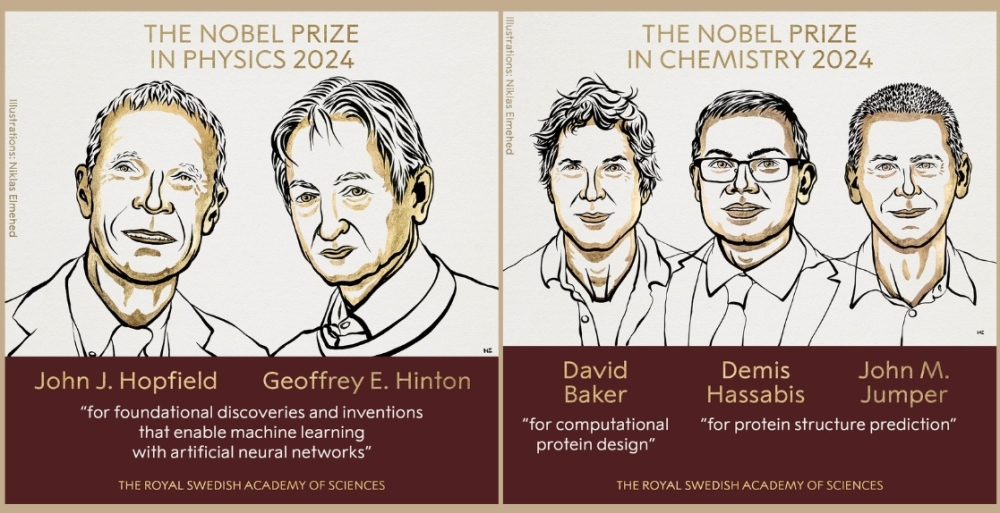

This year's Nobel Prize announcements brought surprise and shock to some scientists, as the Nobel Prizes in Physics and Chemistry were awarded for contributions related to artificial intelligence (AI).
This decision marked a precedent, as some scientists argue that AI has limited connections to traditional fields like physics and chemistry. They see these fields as classical sciences focusing on theoretical phenomena that encompass the universe, life, and the nature of existence.
In contrast, others view AI as emerging from computer science, which continuously evolves with practical rather than theoretical advancements, making AI the latest leap in computational growth.
Despite differing perspectives, it’s undeniable that AI’s roots are grounded in the fusion of mathematical language and foundational physics, a connection that underpins all of computer science. This year's Nobel announcement by the Royal Swedish Academy reflects a new direction, perhaps unconventional, that recognises the modern face of science in our digital age.
Nobel Prizes in Physics were awarded to Geoffrey Hinton and John Hopfield for their foundational contributions to AI, particularly in machine learning, deep learning, and neural networks. The Nobel Prize in Chemistry went to David Baker for his pioneering work in computational protein design and to Demis Hassabis and John Jumper for developing AI-driven techniques to predict protein structures.
This shift underscores AI’s rising impact across fields where traditional methods struggled to unlock complex secrets, like predicting intricate protein structures, a process once time-consuming but now rapidly achieved with AI. Such breakthroughs demonstrate AI’s potential to tackle challenges in other scientific areas, revealing mysteries long out of reach. We are entering an era that not only advances scientific knowledge but redefines our understanding of life itself.
The emphasis on AI’s achievements, highlighted by the Nobel Prizes, brings attention to AI’s transformative role, especially in protein structure prediction. However, this points to a broader scientific revolution where AI delves into even more surprising fields, such as genetics, pushing boundaries in ways previously unimaginable.
In recognising AI’s influence on fields like medicine, climate science, and chemistry, the Nobel announcement encourages the scientific community to adopt AI more deeply. The 2024 Nobel Prize honours are more than celebratory, they signal AI’s crucial role in future research, with AI’s ability to expedite discoveries leading us into new territories across disciplines, from astrophysics to precise biological sciences.

This acknowledgement also highlights the importance of collaboration between public institutions and private enterprises to develop AI-based solutions for global challenges. For digital economy investments, the Nobel Prize fuels commercial investment in AI, aiming for financial returns and contributions to societal, environmental, and health-related issues.
The Nobel Committee’s decision serves as a strong message to the global scientific community: AI is not merely a tool; it’s a transformative force capable of addressing humanity's most complex issues. This recognition inspires increased investment in AI research and motivates a new generation of scientists to explore AI’s vast potential.
Tools like Google’s ‘NotebookLM,’ which employs AI for academic research, exemplify how AI can enhance research quality and speed. After trying this AI-powered platform, it’s evident that it represents a significant leap forward in research methodologies.
However, awarding the Nobel Prize for AI contributions raises important ethical and social questions. While AI offers substantial benefits, it also brings challenges, particularly concerning biases, social inequalities due to job displacement, and accelerating military competition. Reflecting on the 2024 Nobel implications, it is clear that implementing these technologies requires a strong ethical framework, with governance to ensure responsible AI applications and research. As AI increasingly integrates into daily life and decision-making, addressing these concerns becomes ever more critical.
While some may view the Nobel Committee's shift as unconventional, it is a positive step that allows the scientific establishment to adapt to our digital age demands. These awards, recognising AI's contributions, will likely encourage global efforts to harness AI for solving pressing human issues, motivating scientific institutions and governments to create similar awards for AI-driven advancements.
Oman Observer is now on the WhatsApp channel. Click here


